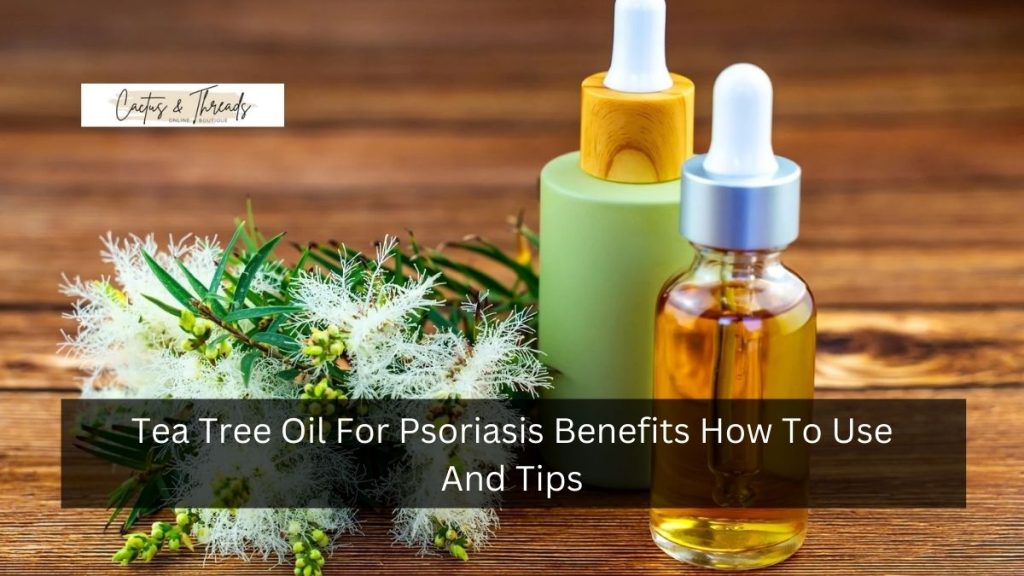
Psoriasis is a chronic autoimmune condition that affects millions of people globally, causing red, scaly patches on the skin that can be uncomfortable and difficult to manage.
While medical treatments are essential, many individuals look for natural remedies to complement their treatment routines. Tea tree oil, known for its anti-inflammatory and antiseptic properties, is one such natural remedy believed to help alleviate psoriasis symptoms.
This article explores how tea tree oil can be used for psoriasis, its benefits, and application tips.
What Is Psoriasis?
Psoriasis is a skin problem caused by a too-strong immune system. It makes red, scaly patches on the skin that can hurt, itch, and bleed. It can show up on different parts of the body like the scalp, elbows, knees, and nails. Around 7.4 million adults in the U.S. have this issue. Stress, infections, sunburns, and some medicines can make it worse.
Common Types of Psoriasis:
- Plaque Psoriasis: The most prevalent type, marked by thick red patches covered with white scales.
- Guttate Psoriasis: Characterized by small, drop-shaped sores, often triggered by bacterial infections.
- Pustular Psoriasis: A more severe type, causing pus-filled blisters and widespread inflammation.
Why Tea Tree Oil is Beneficial for Psoriasis
Tea tree oil is derived from the leaves of the Melaleuca alternifolia plant, native to Australia. Its antimicrobial, anti-inflammatory, and antiseptic properties make it a common ingredient in skincare products.
Tea tree oil is popular among people with psoriasis due to its potential to reduce inflammation and bacterial infections, which can aggravate psoriasis.
Key Benefits of Tea Tree Oil for Psoriasis:
- Anti-Inflammatory: Tea tree oil has potent anti-inflammatory properties that can help soothe the redness and irritation associated with psoriasis.
- Antimicrobial Action: It has been shown to kill bacteria, fungi, and viruses, making it effective against infections that could worsen skin conditions.
- Promotes Healing: The healing properties of tea tree oil help in the regeneration of damaged skin, speeding up the recovery process.
- Reduces Itching: By soothing inflamed skin, tea tree oil may also help to minimize itching, a common symptom of psoriasis.
How to Use Tea Tree Oil for Psoriasis
Before applying tea tree oil to large areas of the skin, it is important to dilute it, as the concentrated oil can cause skin irritation. Here are some safe ways to use tea tree oil for psoriasis:
1. Direct Application (Diluted)
For small psoriasis patches, you can dilute tea tree oil in a carrier oil, such as almond or coconut oil. Mix 5-6 drops of tea tree oil with two tablespoons of the carrier oil and gently massage it onto the affected area. Leave it on overnight for the best results.
- Ingredients: Tea tree oil, coconut or almond oil
- Frequency: Once or twice daily
2. Tea Tree Oil and Aloe Vera Gel
Aloe vera is known for its moisturizing and healing properties, making it a perfect combination with tea tree oil. Mix 10-12 drops of tea tree oil with a cup of aloe vera gel and apply it to the psoriasis patches. Leave it on for at least 20-30 minutes before rinsing.
- Ingredients: Tea tree oil, aloe vera gel
- Frequency: Apply twice a day
3. Tea Tree Oil Shampoo for Scalp Psoriasis
If you suffer from scalp psoriasis, tea tree oil-infused shampoo can help soothe the scalp and reduce inflammation. You can either purchase a tea tree oil shampoo or add a few drops of the oil to your regular shampoo.
- Ingredients: Tea tree oil, mild shampoo
- Frequency: Use whenever you wash your hair
4. Tea Tree Oil and Coconut Oil for Moisturizing
Coconut oil provides moisture and helps to soothe dry, flaky skin that is common in psoriasis. Combine 5-10 drops of tea tree oil with 2 tablespoons of coconut oil and apply it to the affected area. The coconut oil will help lock in moisture, while tea tree oil will reduce irritation.
- Ingredients: Tea tree oil, coconut oil
- Frequency: Apply once or twice daily
5. Apple Cider Vinegar and Tea Tree Oil
Apple cider vinegar can be combined with tea tree oil to help exfoliate and reduce the scaling associated with psoriasis. Mix one tablespoon of apple cider vinegar with 4-5 drops of tea tree oil and apply it to the patches using a cotton ball. Leave it on for 10-15 minutes before rinsing off.
- Ingredients: Apple cider vinegar, tea tree oil, water
- Frequency: Apply 1-2 times a day
Precautions and Side Effects
While tea tree oil is widely praised for its benefits, it’s important to use it cautiously, especially if you have sensitive skin. Here are a few things to keep in mind:
- Always Dilute: Never apply undiluted tea tree oil directly to your skin, as it can cause irritation and burning.
- Do a Patch Test: Before using tea tree oil on a larger area, do a patch test by applying a diluted version to a small area of skin and checking for any adverse reactions.
- Avoid Ingestion: Tea tree oil is for external use only and should never be ingested, as it can be toxic if swallowed.
Other Natural Remedies for Psoriasis
While tea tree oil is one natural remedy, there are others that can complement your treatment routine:
- Aloe Vera: Known for its soothing and moisturizing properties, aloe vera can reduce the redness and scaling associated with psoriasis.
- Dead Sea Salt Baths: These baths can help to remove scales and reduce itchiness in psoriasis-affected areas.
- Omega-3 Fatty Acids: Found in fish oil supplements, omega-3s can help reduce inflammation from the inside out.
Conclusion:
Tea tree oil is a promising natural remedy for managing psoriasis symptoms such as inflammation, scaling, and itching. While it may not replace medical treatments, it can be a helpful addition to your skincare routine, offering relief and promoting healing.
As always, consult with a healthcare provider before trying any new treatment to ensure it’s safe and effective for your individual needs. With the right combination of medical and natural treatments, managing psoriasis becomes more achievable.







